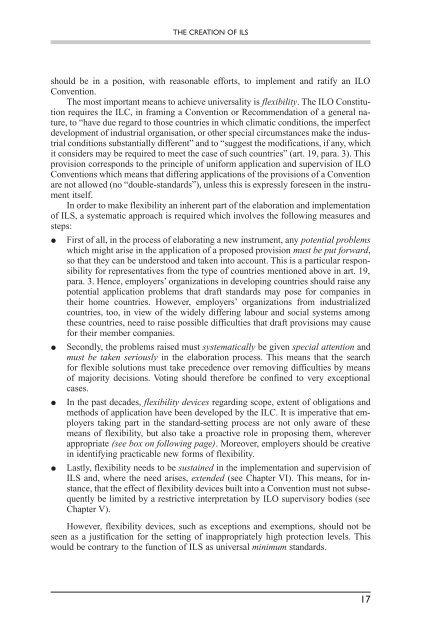Employers' Handbook on ILO Standards-related Activities
Employers' Handbook on ILO Standards-related Activities
Employers' Handbook on ILO Standards-related Activities
You also want an ePaper? Increase the reach of your titles
YUMPU automatically turns print PDFs into web optimized ePapers that Google loves.
THE CREATION OF ILS<br />
should be in a positi<strong>on</strong>, with reas<strong>on</strong>able efforts, to implement and ratify an <strong>ILO</strong><br />
C<strong>on</strong>venti<strong>on</strong>.<br />
The most important means to achieve universality is flexibility. The <strong>ILO</strong> C<strong>on</strong>stituti<strong>on</strong><br />
requires the ILC, in framing a C<strong>on</strong>venti<strong>on</strong> or Recommendati<strong>on</strong> of a general nature,<br />
to “have due regard to those countries in which climatic c<strong>on</strong>diti<strong>on</strong>s, the imperfect<br />
development of industrial organisati<strong>on</strong>, or other special circumstances make the industrial<br />
c<strong>on</strong>diti<strong>on</strong>s substantially different” and to “suggest the modificati<strong>on</strong>s, if any, which<br />
it c<strong>on</strong>siders may be required to meet the case of such countries” (art. 19, para. 3). This<br />
provisi<strong>on</strong> corresp<strong>on</strong>ds to the principle of uniform applicati<strong>on</strong> and supervisi<strong>on</strong> of <strong>ILO</strong><br />
C<strong>on</strong>venti<strong>on</strong>s which means that differing applicati<strong>on</strong>s of the provisi<strong>on</strong>s of a C<strong>on</strong>venti<strong>on</strong><br />
are not allowed (no “double-standards”), unless this is expressly foreseen in the instrument<br />
itself.<br />
In order to make flexibility an inherent part of the elaborati<strong>on</strong> and implementati<strong>on</strong><br />
of ILS, a systematic approach is required which involves the following measures and<br />
steps:<br />
l First of all, in the process of elaborating a new instrument, any potential problems<br />
which might arise in the applicati<strong>on</strong> of a proposed provisi<strong>on</strong> must be put forward,<br />
so that they can be understood and taken into account. This is a particular resp<strong>on</strong>sibility<br />
for representatives from the type of countries menti<strong>on</strong>ed above in art. 19,<br />
para. 3. Hence, employers’ organizati<strong>on</strong>s in developing countries should raise any<br />
potential applicati<strong>on</strong> problems that draft standards may pose for companies in<br />
their home countries. However, employers’ organizati<strong>on</strong>s from industrialized<br />
countries, too, in view of the widely differing labour and social systems am<strong>on</strong>g<br />
these countries, need to raise possible difficulties that draft provisi<strong>on</strong>s may cause<br />
for their member companies.<br />
l Sec<strong>on</strong>dly, the problems raised must systematically be given special attenti<strong>on</strong> and<br />
must be taken seriously in the elaborati<strong>on</strong> process. This means that the search<br />
for flexible soluti<strong>on</strong>s must take precedence over removing difficulties by means<br />
of majority decisi<strong>on</strong>s. Voting should therefore be c<strong>on</strong>fined to very excepti<strong>on</strong>al<br />
cases.<br />
l In the past decades, flexibility devices regarding scope, extent of obligati<strong>on</strong>s and<br />
methods of applicati<strong>on</strong> have been developed by the ILC. It is imperative that employers<br />
taking part in the standard-setting process are not <strong>on</strong>ly aware of these<br />
means of flexibility, but also take a proactive role in proposing them, wherever<br />
appropriate (see box <strong>on</strong> following page). Moreover, employers should be creative<br />
in identifying practicable new forms of flexibility.<br />
l Lastly, flexibility needs to be sustained in the implementati<strong>on</strong> and supervisi<strong>on</strong> of<br />
ILS and, where the need arises, extended (see Chapter VI). This means, for instance,<br />
that the effect of flexibility devices built into a C<strong>on</strong>venti<strong>on</strong> must not subsequently<br />
be limited by a restrictive interpretati<strong>on</strong> by <strong>ILO</strong> supervisory bodies (see<br />
Chapter V).<br />
However, flexibility devices, such as excepti<strong>on</strong>s and exempti<strong>on</strong>s, should not be<br />
seen as a justificati<strong>on</strong> for the setting of inappropriately high protecti<strong>on</strong> levels. This<br />
would be c<strong>on</strong>trary to the functi<strong>on</strong> of ILS as universal minimum standards.<br />
17

















